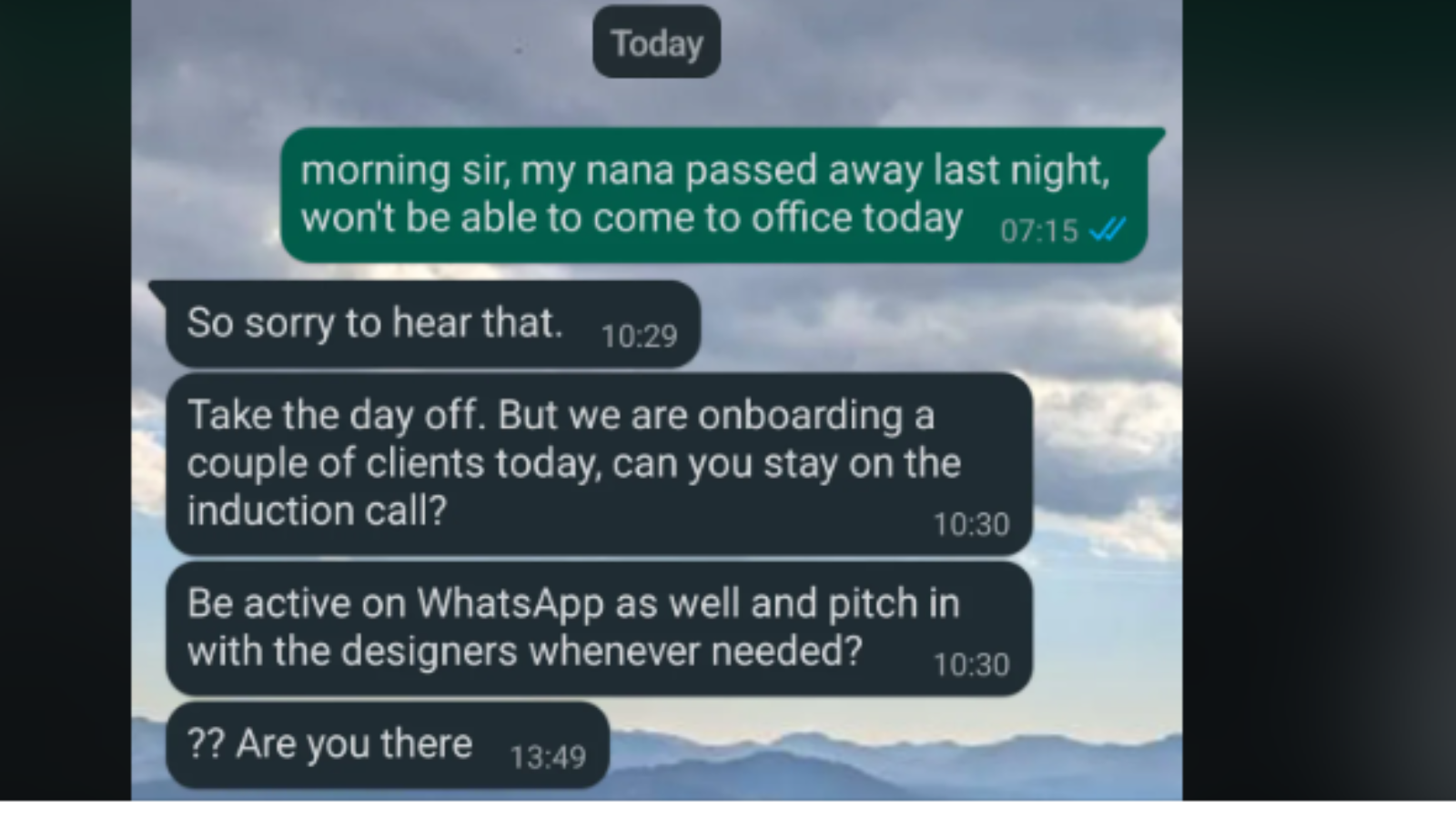‘Can You Join The Call?’: Outrage Over Indian Managers Expecting Work During Bereavement
A viral Reddit post has ignited widespread anger over Indian managers treating grief as just another workday, highlighting a growing concern about toxic workplace cultures.
The anonymous poster, an employee at a marketing agency, shared his experience after two years of dedicated service, navigating frequent role changes, added responsibilities from layoffs, and tight budgets. Despite enjoying his work and team, the situation turned stressful when he faced a personal loss.
“My nana passed away last night, won’t be able to come to the office today,” he messaged his manager. Initially, the response seemed compassionate: “So sorry to hear that. Take the day off.” But moments later, the manager followed up: “But we are onboarding a couple of clients today. Can you stay on the induction call?” and added, “Be active on WhatsApp as well and pitch in with the designers whenever needed.”
Frustrated, the employee expressed his dismay: “Do managers forget that we're people and not just machines churning out results?”
The post quickly went viral, racking up hundreds of reactions. Many users shared similar stories or offered support. One advised: “If you don’t, he will think his behaviour is justifiable.” Another suggested a bold move: “Put the screenshot in your resignation email and mark the CEO.”
The discussion also sparked debate about the wider work culture in India. “Because of this 'Chalta hai' and 'Slavery' attitude, I left India and now settled in Denmark,” wrote one user, contrasting Indian workplaces with those abroad.
Some managers shared a different perspective, emphasising empathy and protection of their team. An Indian engineering manager wrote: “When one of my team member’s father passed away, I told him to take two weeks off. I even scolded him for checking Slack on Sunday.” He stressed that “work and clients can come afterwards” and that being a manager means shielding your team during life’s critical moments.
This incident serves as a reminder that workplace empathy is not just desirable it’s essential. Managers who prioritise human wellbeing build loyalty and a healthier work environment, while those who dismiss personal grief risk demoralising their teams.

The anonymous poster, an employee at a marketing agency, shared his experience after two years of dedicated service, navigating frequent role changes, added responsibilities from layoffs, and tight budgets. Despite enjoying his work and team, the situation turned stressful when he faced a personal loss.
“My nana passed away last night, won’t be able to come to the office today,” he messaged his manager. Initially, the response seemed compassionate: “So sorry to hear that. Take the day off.” But moments later, the manager followed up: “But we are onboarding a couple of clients today. Can you stay on the induction call?” and added, “Be active on WhatsApp as well and pitch in with the designers whenever needed.”
You may also like
- South Korea proposes military talks with North Korea to prevent possible clashes at border
- The German government says it's lifting restrictions on exports of military equipment to Israel
- Anthony Davis injury update: Star player's fate takes shocking turn as Dallas Mavericks face unexpected injury setback
 HAM never applied pressure for ministerial berth, says Manjhi
HAM never applied pressure for ministerial berth, says Manjhi- 'Company will replace you in 2 weeks, your family can't': Delhi cardiologist warns about what is killing you and he says its not your job
Frustrated, the employee expressed his dismay: “Do managers forget that we're people and not just machines churning out results?”
The post quickly went viral, racking up hundreds of reactions. Many users shared similar stories or offered support. One advised: “If you don’t, he will think his behaviour is justifiable.” Another suggested a bold move: “Put the screenshot in your resignation email and mark the CEO.”
The discussion also sparked debate about the wider work culture in India. “Because of this 'Chalta hai' and 'Slavery' attitude, I left India and now settled in Denmark,” wrote one user, contrasting Indian workplaces with those abroad.
Some managers shared a different perspective, emphasising empathy and protection of their team. An Indian engineering manager wrote: “When one of my team member’s father passed away, I told him to take two weeks off. I even scolded him for checking Slack on Sunday.” He stressed that “work and clients can come afterwards” and that being a manager means shielding your team during life’s critical moments.
This incident serves as a reminder that workplace empathy is not just desirable it’s essential. Managers who prioritise human wellbeing build loyalty and a healthier work environment, while those who dismiss personal grief risk demoralising their teams.









